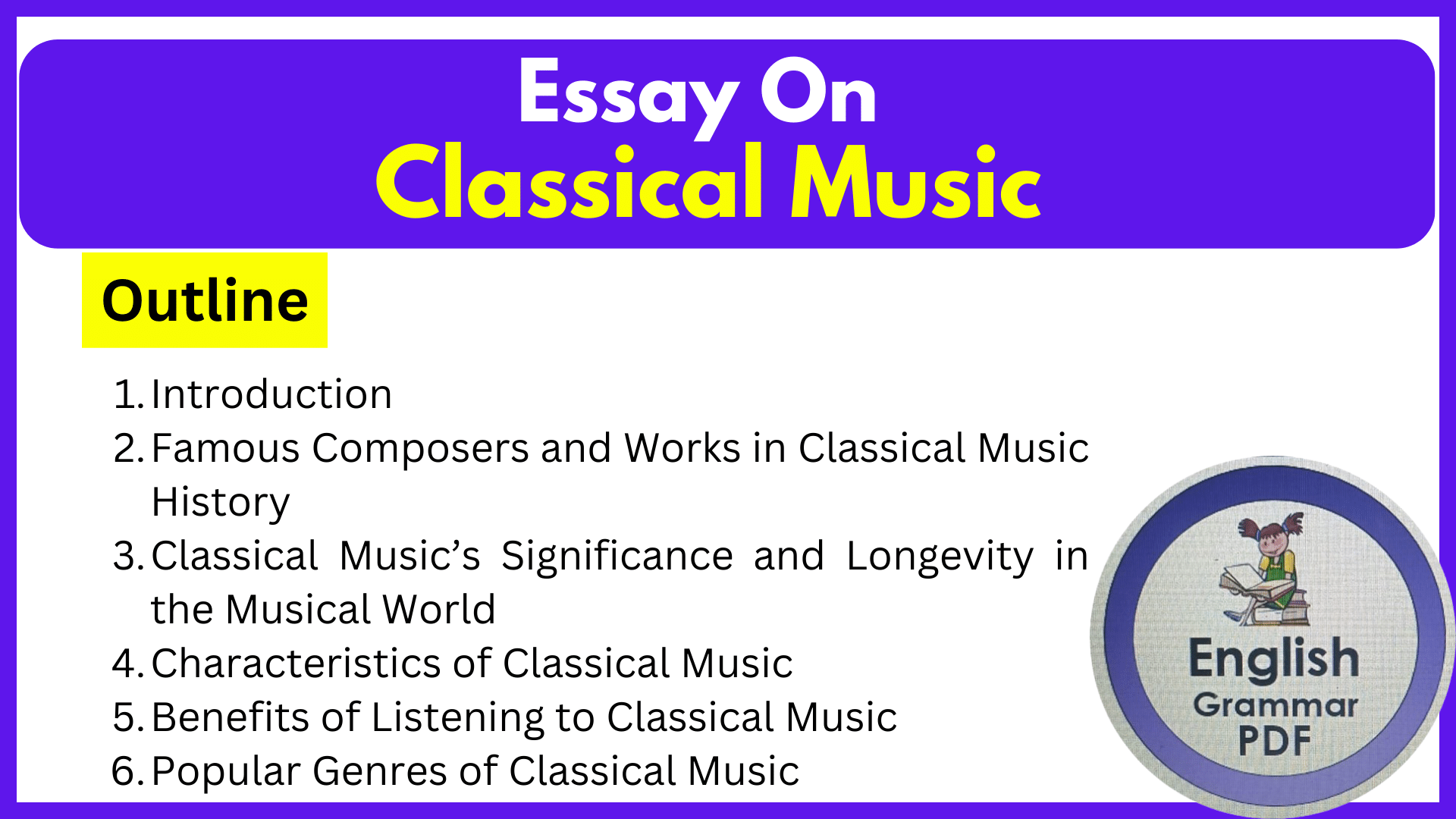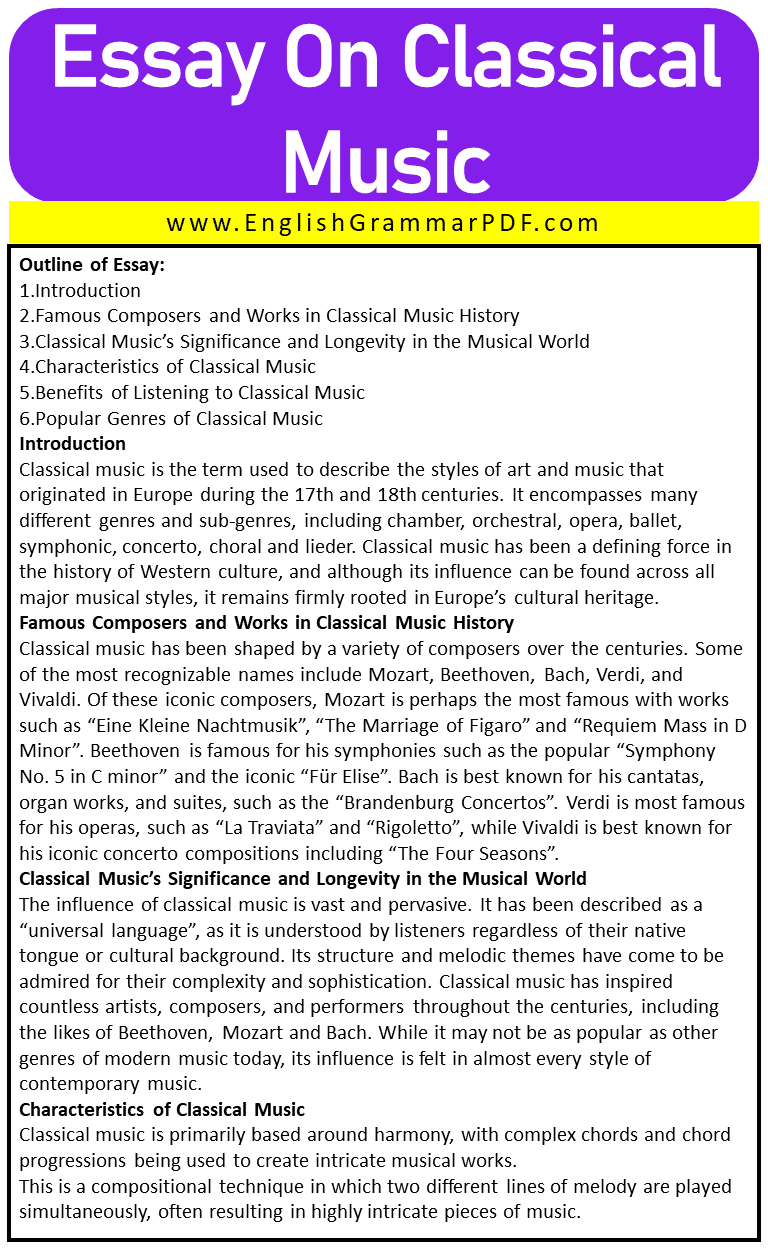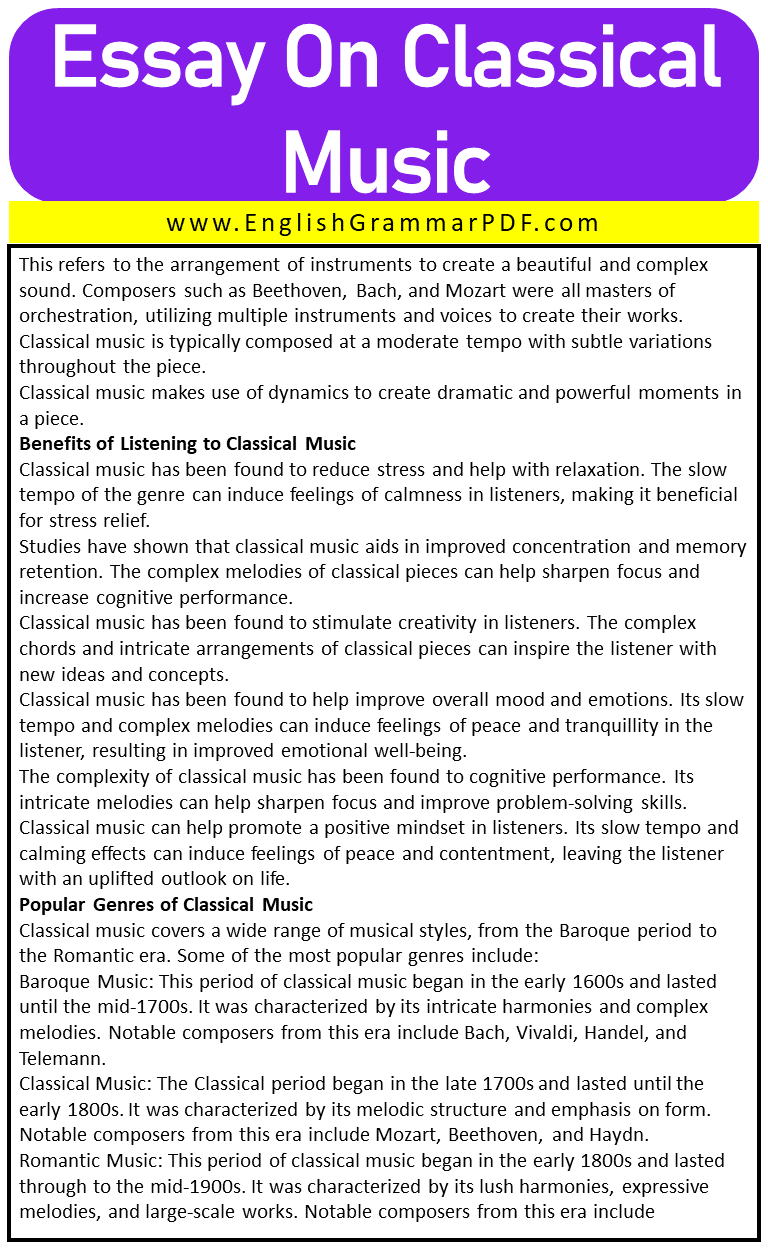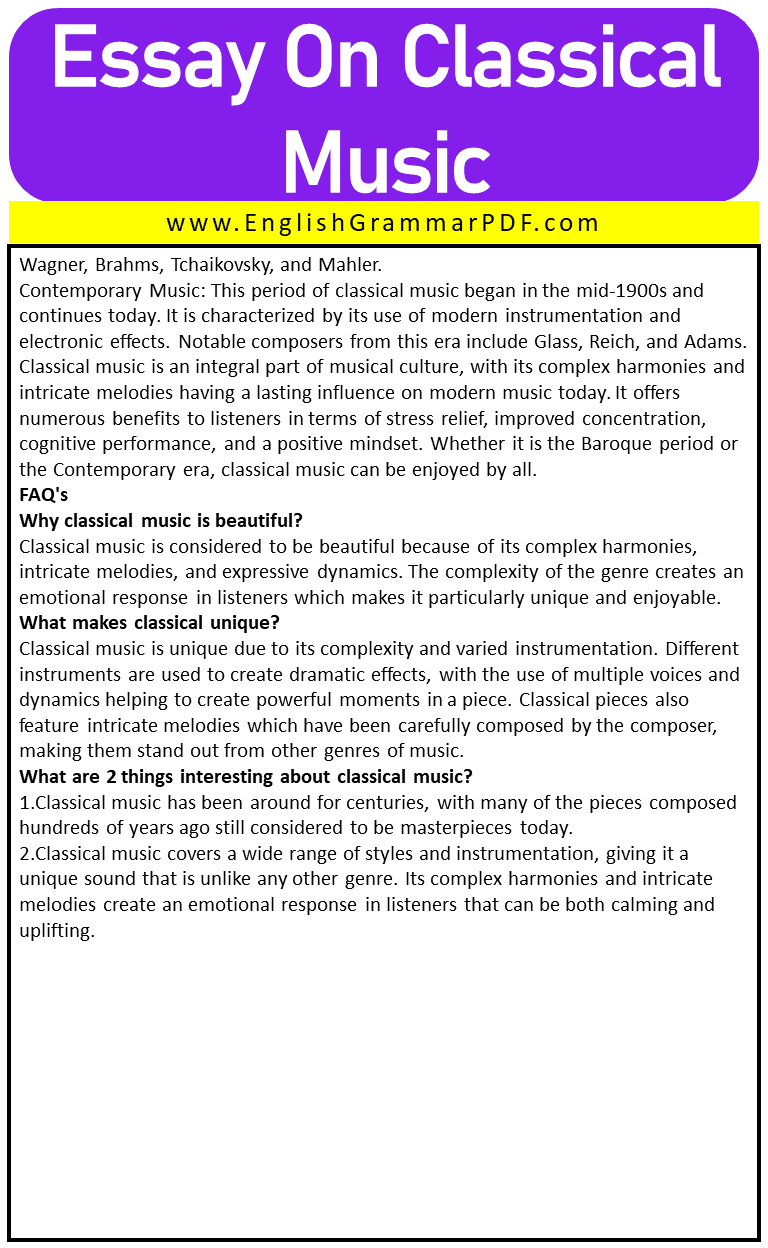Essay On Classical Music
Outline of Essay:
- Introduction
- Famous Composers and Works in Classical Music History
- Classical Music’s Significance and Longevity in the Musical World
- Characteristics of Classical Music
- Benefits of Listening to Classical Music
- Popular Genres of Classical Music
Introduction
Classical music is the term used to describe the styles of art and music that originated in Europe during the 17th and 18th centuries. It encompasses many different genres and sub-genres, including chamber, orchestral, opera, ballet, symphonic, concerto, choral and lieder. Classical music has been a defining force in the history of Western culture, and although its influence can be found across all major musical styles, it remains firmly rooted in Europe’s cultural heritage.
Famous Composers and Works in Classical Music History
Classical music has been shaped by a variety of composers over the centuries. Some of the most recognizable names include Mozart, Beethoven, Bach, Verdi, and Vivaldi. Of these iconic composers, Mozart is perhaps the most famous with works such as “Eine Kleine Nachtmusik”, “The Marriage of Figaro” and “Requiem Mass in D Minor”. Beethoven is famous for his symphonies such as the popular “Symphony No. 5 in C minor” and the iconic “Für Elise”. Bach is best known for his cantatas, organ works, and suites, such as the “Brandenburg Concertos”. Verdi is most famous for his operas, such as “La Traviata” and “Rigoletto”, while Vivaldi is best known for his iconic concerto compositions including “The Four Seasons”.
Classical Music’s Significance and Longevity in the Musical World
The influence of classical music is vast and pervasive. It has been described as a “universal language”, as it is understood by listeners regardless of their native tongue or cultural background. Its structure and melodic themes have come to be admired for their complexity and sophistication. Classical music has inspired countless artists, composers, and performers throughout the centuries, including the likes of Beethoven, Mozart and Bach. While it may not be as popular as other genres of modern music today, its influence is felt in almost every style of contemporary music.
Characteristics of Classical Music
Classical music is primarily based around harmony, with complex chords and chord progressions being used to create intricate musical works.
This is a compositional technique in which two different lines of melody are played simultaneously, often resulting in highly intricate pieces of music.
This refers to the arrangement of instruments to create a beautiful and complex sound. Composers such as Beethoven, Bach, and Mozart were all masters of orchestration, utilizing multiple instruments and voices to create their works.
Classical music is typically composed at a moderate tempo with subtle variations throughout the piece.
Classical music makes use of dynamics to create dramatic and powerful moments in a piece.
Benefits of Listening to Classical Music
Classical music has been found to reduce stress and help with relaxation. The slow tempo of the genre can induce feelings of calmness in listeners, making it beneficial for stress relief.
Studies have shown that classical music aids in improved concentration and memory retention. The complex melodies of classical pieces can help sharpen focus and increase cognitive performance.
Classical music has been found to stimulate creativity in listeners. The complex chords and intricate arrangements of classical pieces can inspire the listener with new ideas and concepts.
Classical music has been found to help improve overall mood and emotions. Its slow tempo and complex melodies can induce feelings of peace and tranquillity in the listener, resulting in improved emotional well-being.
The complexity of classical music has been found to cognitive performance. Its intricate melodies can help sharpen focus and improve problem-solving skills.
Classical music can help promote a positive mindset in listeners. Its slow tempo and calming effects can induce feelings of peace and contentment, leaving the listener with an uplifted outlook on life.
Popular Genres of Classical Music
Classical music covers a wide range of musical styles, from the Baroque period to the Romantic era. Some of the most popular genres include:
Baroque Music: This period of classical music began in the early 1600s and lasted until the mid-1700s. It was characterized by its intricate harmonies and complex melodies. Notable composers from this era include Bach, Vivaldi, Handel, and Telemann.
Classical Music: The Classical period began in the late 1700s and lasted until the early 1800s. It was characterized by its melodic structure and emphasis on form. Notable composers from this era include Mozart, Beethoven, and Haydn.
Romantic Music: This period of classical music began in the early 1800s and lasted through to the mid-1900s. It was characterized by its lush harmonies, expressive melodies, and large-scale works. Notable composers from this era include Wagner, Brahms, Tchaikovsky, and Mahler.
Contemporary Music: This period of classical music began in the mid-1900s and continues today. It is characterized by its use of modern instrumentation and electronic effects. Notable composers from this era include Glass, Reich, and Adams.
Classical music is an integral part of musical culture, with its complex harmonies and intricate melodies having a lasting influence on modern music today. It offers numerous benefits to listeners in terms of stress relief, improved concentration, cognitive performance, and a positive mindset. Whether it is the Baroque period or the Contemporary era, classical music can be enjoyed by all.
FAQ’s
Why classical music is beautiful?
Classical music is considered to be beautiful because of its complex harmonies, intricate melodies, and expressive dynamics. The complexity of the genre creates an emotional response in listeners which makes it particularly unique and enjoyable.
What makes classical unique?
Classical music is unique due to its complexity and varied instrumentation. Different instruments are used to create dramatic effects, with the use of multiple voices and dynamics helping to create powerful moments in a piece. Classical pieces also feature intricate melodies which have been carefully composed by the composer, making them stand out from other genres of music.
What are 2 things interesting about classical music?
- Classical music has been around for centuries, with many of the pieces composed hundreds of years ago still considered to be masterpieces today.
- Classical music covers a wide range of styles and instrumentation, giving it a unique sound that is unlike any other genre. Its complex harmonies and intricate melodies create an emotional response in listeners that can be both calming and uplifting.
Explore More Essays:
Download the PDF of Essay:






